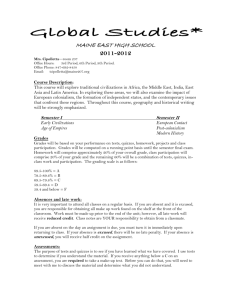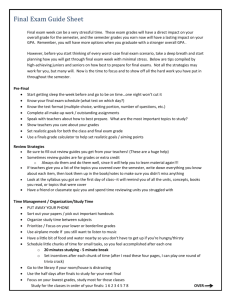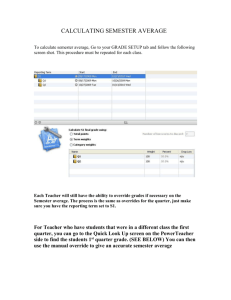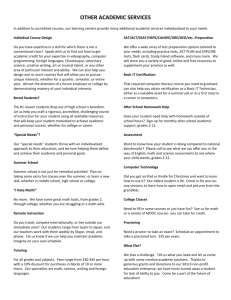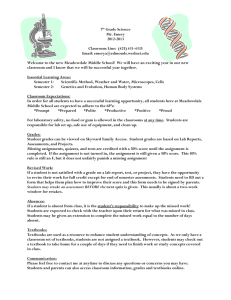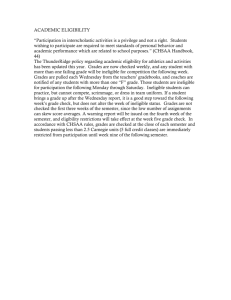Anthropology 151 - DePauw University
advertisement
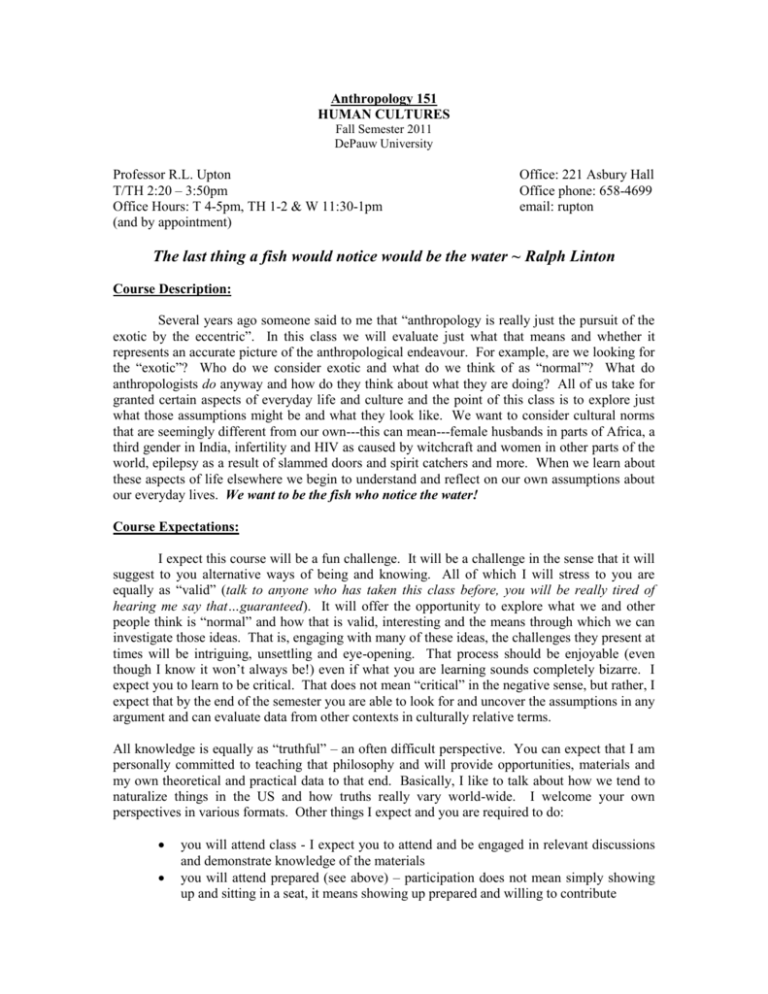
Anthropology 151 HUMAN CULTURES Fall Semester 2011 DePauw University Professor R.L. Upton T/TH 2:20 – 3:50pm Office Hours: T 4-5pm, TH 1-2 & W 11:30-1pm (and by appointment) Office: 221 Asbury Hall Office phone: 658-4699 email: rupton The last thing a fish would notice would be the water ~ Ralph Linton Course Description: Several years ago someone said to me that “anthropology is really just the pursuit of the exotic by the eccentric”. In this class we will evaluate just what that means and whether it represents an accurate picture of the anthropological endeavour. For example, are we looking for the “exotic”? Who do we consider exotic and what do we think of as “normal”? What do anthropologists do anyway and how do they think about what they are doing? All of us take for granted certain aspects of everyday life and culture and the point of this class is to explore just what those assumptions might be and what they look like. We want to consider cultural norms that are seemingly different from our own---this can mean---female husbands in parts of Africa, a third gender in India, infertility and HIV as caused by witchcraft and women in other parts of the world, epilepsy as a result of slammed doors and spirit catchers and more. When we learn about these aspects of life elsewhere we begin to understand and reflect on our own assumptions about our everyday lives. We want to be the fish who notice the water! Course Expectations: I expect this course will be a fun challenge. It will be a challenge in the sense that it will suggest to you alternative ways of being and knowing. All of which I will stress to you are equally as “valid” (talk to anyone who has taken this class before, you will be really tired of hearing me say that…guaranteed). It will offer the opportunity to explore what we and other people think is “normal” and how that is valid, interesting and the means through which we can investigate those ideas. That is, engaging with many of these ideas, the challenges they present at times will be intriguing, unsettling and eye-opening. That process should be enjoyable (even though I know it won’t always be!) even if what you are learning sounds completely bizarre. I expect you to learn to be critical. That does not mean “critical” in the negative sense, but rather, I expect that by the end of the semester you are able to look for and uncover the assumptions in any argument and can evaluate data from other contexts in culturally relative terms. All knowledge is equally as “truthful” – an often difficult perspective. You can expect that I am personally committed to teaching that philosophy and will provide opportunities, materials and my own theoretical and practical data to that end. Basically, I like to talk about how we tend to naturalize things in the US and how truths really vary world-wide. I welcome your own perspectives in various formats. Other things I expect and you are required to do: you will attend class - I expect you to attend and be engaged in relevant discussions and demonstrate knowledge of the materials you will attend prepared (see above) – participation does not mean simply showing up and sitting in a seat, it means showing up prepared and willing to contribute you will feel free to come and see me if you are having any difficulties or just want to talk more about the class, anthropology or whatever else you need you will hand in all assignments on time-I will accept a late paper but will penalize it accordingly in order to be fair to others you will feel free to voice your insights and simultaneously respect the freedoms of others to voice theirs (this one is hugely important in a class where we think and learn about other cultures, ways of doing things and belief systems!) keep an open mind please above all. Course Evaluation: Everyone probably tells you this, but let’s be clear: according to the DePauw University handbook the grading system is as follows: A, Agrades reflect “achievement of exceptionally high merit” B+, B, B- grades reflect “achievement at a level superior to the basic level” C+, C, C- grades reflect “basic achievement” D+, D, D- grades reflect “achievement which falls short of satisfying the quantitative and qualitative requirements yet warrants credit” What this means for this class is that work that satisfies instruction and basic material will receive grades which reflect that basic achievement-C grades. In order to receive B grades, your work must demonstrate superior work in terms of your own critical insight, synthesis and communication skills. This is really very important because many of us are used to getting the “A” grade and view “B”s as poor grades…Please don’t believe that. Getting a B in this course, and in any good course at DePauw is reflective of really very GOOD work. A grades reflect exceptionally high levels of achievement and reflect a high degree of intellectual rigor and carefully considered work. Throughout the semester remember that you are accumulating points – your final grade is a total out of 300 possible points – while you will be busy calculating and keeping track of your points/grades along the way, please keep in mind that you are working toward that final goal and therefore your calculations along the way are estimations. While I will subtract points for errors or deficiencies I will happily add points for carefully written, imaginative thinking and communication. Please let me know throughout the semester if you have any questions or if any aspect of your grade is unclear. This is a dialectical enterprise-a discussion between us and the whole point is that we all get something out of it. One last thing-your grade is based upon your own mastery of the material-it is not based on how you compared with others in the class. *I urge you to do two things this semester: take advantage of the Writing Center – learning to craft a well written essay and communicate ideas in a persuasive manner are cornerstones of anthropology, your education at DePauw and life itself – they are here to help, use the center. Secondly, make certain that you understand the Academic Integrity Policy here at the University. If you are at all uncertain about what counts as plagiarism please ask – what we learn is grounded in the work of others but learning to interpret and communicate new ideas based upon that knowledge and in our own manner is essential. Do not plagiarize. Even cutting and pasting things from the web is mosaic plagiarism. Penalties for this practice are severe and not worth finding out about – just do not do it and if you are worried, ask. The only bad/silly/ridiculous questions are those that are never asked. Points are assigned as follows: Exam #1 40 points Exam #2 60 points Exam #3 (Final) 80 points Paper #1 20 points Paper #2 25 points Paper #3 30 points Class participation 25 points Letters to me 20 points -----------------------------------------Total possible: 300 points *Note on Participation: You will notice that class participation is the equivalent to one of your papers. Essentially this means that participating in and attending class are really important-you cannot participate if you are not there! If you are going to miss class, it is your responsibility to let me know in advance and your responsibility to get the information we covered. It is an important part of the grade and I expect you to be active, engaged members of this class community. I urge you to speak to me if you are concerned about your participation. ADA STATEMENT: “DePauw University is committed to providing equal access to academic programs and University administered activities and reasonable accommodations to students with disabilities, in compliance with the Americans With Disabilities Act and Amendments (ADAAA). Any student who feels she or he may need an accommodation based on the impact of a disability or learning challenge is strongly encouraged to contact Pamela Roberts, Coordinator of Academic Success and Student Disability Services, for further information on how to receive accommodations and support. Academic Success and Student Disability Services is located in Harrison Hall, 302 A, 765-658-6267. It is the responsibility of the student to share the letter of accommodation faculty and staff members. Accommodations will not be implemented until the faculty or staff member has received the official letter. Accommodations are not retroactive. It is the responsibility of the student to discuss implementation of accommodations with each faculty and staff member receiving the letter.” Letters Due: (Read this! It is 20 points toward your grade!) As part of your participation in this class you are asked to write to me. On five occasions throughout the semester (due dates marked in the syllabus, there are seven opportunities, you must do five, there is no credit for doing extra, just do five) you will turn in to me, a typed OR handwritten letter in which you reflect on the readings, class, or whatever else you think relates to what is going on based upon what we are learning in class. I WILL NOT ACCEPT EMAIL VERSIONS OF THESE LETTERS. You should spend some time thinking about and writing down your thoughts as they relate to class apart from normative email correspondence. These letters need not be long, they can be whatever length you think expresses what you are trying to think about. I am not giving these letters letter grades per se, but they do count, they equal points. To clarify: there are seven opportunities; you must do FIVE for a total of 20 points. Why you may ask, are these assigned? Because I think that at times we think and process our thoughts about what we hear or learn or connect throughout the day at different points other than in the classroom. Here is your opportunity to demonstrate your thoughtful, creative, reflective and intellectual ways of synthesizing your anthropological experience at DePauw and in Greencastle. Required Readings: *All of the readings for the course are available at the Bookstore or Amazon.com *Additional articles will be posted on Moodle or given to you in class and I will on occasion give you additional readings in class as I come across relevant materials. You all should feel free to suggest additional writings or cartoons that you come across and are of interest. Funny jokes always accepted… Dancing Skeletons. Kathryn Dettwyler A Thrice Told Tale, Margery Wolf The Innocent Anthropologist, Nigel Barley The Spirit Catches You and You Fall Down, Anne Fadiman Consuming Grief, Beth Conklin Portraits of the Whiteman, Keith Basso Course Schedule of Events: Week 1: TH 8/25 Week 2: T 8/30 TH 9/1: Introduction to the course & syllabus Some basic concepts, problems and terms Read: “Shakespeare in the Bush”, Laura Bohannan What is an anthropologist? Or – ‘do you study mammoths?’ Read: “Body Ritual Among the Nacirema”, Horace Miner, “Did You?” Ward Goodenough Week 3: T 9/6: Read: “Culture Shock in Paradise”, Ellen Holmes, Dettwyler chps. 1-5 TH 9/8: Basic concepts continued…insiders and outsiders, adaptation, environment, sex, gender and other terms in the discipline Where exactly is the field? Read: Dettwyler, chps. 6-11 [Letter Opportunity #1] Week 4: Week 5: T 9/13: How do I know if I did it right? emic vs. etic Discussion of methodologies and practice Read: Dettwyler, finish TH 9/15: Ethics and Ethnography Read: A Thrice Told Tale, Margery Wolf also read and bring to class the AAA statement on Ethics: www.aaanet.org/committees/ethics/ethcode.htm T 9/20: Read: The Innocent Anthropologist, Nigel Barley, chps. 1-7 TH 9/22: More on Fieldwork and Interpreting the Other Read: The Innocent Anthropologist, Nigel Barley, finish [Letter Opportunity # 2] Week 6: T 9/27: Kinship and Family Read: “Adopt a Daughter-in-law, Marry a Sister: A Chinese Solution to the Incest Taboo”, Arthur P. Wolf. Paper # 1 Due TH 9/29: The Meaning of Marriage and the Idea of Family Read: “Arranging a Marriage in India”, Serena Nanda Read: “Exiles From Kinship”, Kath Weston, Week 7: T 10/4: Exam # 1 TH 10/6: More on Kinship and Sexuality Read: “Mummies and Babies” and Friends and Lovers in Lesotho”, Judith Gay, “Ritualized Homosexuality in a Nacirema Subculture”, Michael Kimmel [Letter Opportunity # 3] Week 8: T/10/11: Explaining Race and Ethnicity and the Importance of Language Assignment: Look at the AAA webpage and find the statement on Race,read it and bring to class: www.aaanet.org/stmts/racepp.htm Read: “Mixed Blood”, Jeffery M. Fish, Portraits of the Whiteman, Keith Basso, up to page 33. TH 10/13: Read: “Blood on the Steppes: Ethnicity, Power and Conflict”, Jack Weatherford; Basso, finish entire. Week 9: [Fall Break 15 October – 23 October] Week 10: T 10/25: Ritual of Exchange Read: “Navigating Nigerian Bureaucracies; or ‘Why Can’t You Beg?’ She Demanded”, Elizabeth Eames TH 10/27: Discussion in class of ritual and gift giving and the interpretation Of events, Read: “The Matter of the Chickens”, Anonymous [Letter Opportunity # 4] Week 11: T 11/1: Gender & the Body Read: Read: “Warriors or Soldiers? Masculinity in the Liberian Civil War”,Mary H. Moran; “Hijras of India: Cultural and Individual Dimensions of an Institutionalized Third Gender Role” Serena Nanda TH 11/3: Read: “Fat Eggs”, R.L. Upton Week 12: T 11/8: Magic and Witchcraft Read: The Spirit Catches You and You Fall Down, Anne Fadiman; Chps: 1-8 Paper # 2 Due TH 11/10: Illness and Healing Read: The Spirit Catches You…chps: 9-15 [Letter Opportunity # 5] Week 13: T 11/15: Read: finish The Spirit Catches You…chps: 16-19 TH 11/17: Exam # 2 Week 14: T 11/ 22: More on Culture contact and are there Human Universals? Read: Consuming Grief, Beth Conklin, Part I [Thanksgiving] Week 15: T 11/29: Read: Conklin, Part II and III [Letter Opportunity # 6] TH 12/1: Read: Conklin, finish Week 16: T 12/6: Read: Read: “How Sushi Went Global”, Theodore Bestor, “Adaptive Failure: Easter’s End”, Jared Diamond Paper # 3 Due TH 12/8: What have we learned? Reflections on Fieldwork, Falsehoods and the Making of Meaning in Everyday Lives, Making meaning of Anthropology-how was this class relevant at all? Read: “How Native is the Native Anthropologist?”, Kirin Narayan [Letter Opportunity # 7] Final Exam [Exam #3]: Tuesday 13 December 1-4pm
